I have an uneasy relationship with boats.
There you go. Now it’s out in the open.
I suspect, though, that most folks who share my views about watercraft come to their ambivalence more honestly. Maybe they’re afraid of water. Perhaps they’re uneasy in a vessel that can tip over in a high wind, or be swamped by waves, or that will take on water and sink if the boat’s structural integrity is breached, or if its weight limit is exceeded, or if there’s a serious operator error.
Whether we’re talking about drift boats or canoes or row boats or power boats or kayaks, we should all recognize that boats can be dangerous. In fact, they are inherently dangerous. So it’s understandable that people who can’t swim, or who have a fear of drowning, or who are nervous around water, might exhibit trepidation or ambivalence when it comes to watercraft.
But that’s not my issue.
More Like This
Nope, the reason I told Molly — my wife — that I never wanted to own another boat was much more nefarious.
First, boats are way, way too much work. They need to be washed and cleaned on a regular basis, and kept in working order, and stored properly when they’re not in use, while boat trailers also require regular maintenance and upkeep. Who has the time for all that?
Second — and this is huge — the boat owner is almost always the boat operator, which means that the guy (or gal) who owns the boat spends far less time fishing and far more time maneuvering said boat for the benefit of family or friends.
Now I like to think that I’m a reasonably generous person, and I consciously try to spread happiness among the people I interact with. (Which, given the world we live in right now, seems like a good thing.) But I also like to fish. In fact, I love to fish. And since I’m on the water a little less these days, with modernity’s frequent demands and 2021’s unique challenges taking precedence over my never-ending desire to wet a line, I’m not sure that there’s room for a boat in my life right now.
That makes sense, right?
Keep in mind that I almost always have plenty of fly fishing gear in my truck, so all I have to do to scratch my angling itch is jump in my rig, drive ten minutes to the closest Montana river, throw on my waders, string up a rod, and I’m all set. I can walk where I want, and wade where I want, and I don’t have to worry whether I have enough life jackets, or whether I remembered the drain plugs, or if I’m going to throw my back out hooking up the trailer to the truck.
There’s an ease, and an innate simplicity, to fly fishing sans a boat. For those of you who’ve studied eastern philosophies, it’s more zen and less chaos. And given the amount of chaos floating around the globe today, a little on-the-water zen is something I can really aspire to.
I should also point out that this wasn’t some sudden cosmological shift on my part. I sold my last boat — the final in a series of drift boats I once owned— more than 20 years ago, and I did so purposefully, and without even a smidge of regret.
Which means that when Molly pointed to a large box under the Christmas tree two years ago and said, “That one is for you,” I was not expecting a drift boat anchor. As should be obvious to even the most inattentive reader, without a boat, I had no need for an anchor.
But a gift-wrapped anchor was what I received, and I was … well, I was confused. After all, my wife knows how I feel about boats. When I pulled the wrapping paper off that anchor the year before last, Molly immediately noticed the perplexed look on my face and mentioned, just to clear things up, that she couldn’t fit the entire boat under the tree.
Looking back now, it all makes sense. We had a 13 year old boy — he’s 15 now — and I was in position to teach him how to row, and fish, and guide, which are all valuable skills when you’re anticipating the acute financial distress associated with a college education in the 2020s. A kid who can make a decent amount of cash over the course of a summer by guiding is far better equipped for college than a kid who has to rely on what his, or her, parents can cobble together in these uncertain times.
In addition, a teenager with all the various and sundry fly fishing and boating skills to help out at his old man’s fly fishing school is a pretty wonderful thing as well.
In any case, as I stood in the living room holding that huge steel anchor, I had momentary visions of a handsome new boat in the driveway. Those visions, however, faded away when I noticed how beat-to-hell the anchor appeared to be. The steel was scarred and pitted and tinged with rust, and as the anchor foreshadowed, the boat and trailer were in a similar state.
I should also point out that the boat wasn’t really a gift. Molly, who is a partner in my ongoing fly fishing enterprise, decided that a fly fishing school without a boat was at a distinct competitive disadvantage … and so she remedied that situation, knowing that our School of Trout’s students would benefit from hands-on drift boat fishing lessons.
So now we have a drift boat.
This particular boat is an old — some might say “ancient” — low-sided Clackacraft that my high school buddy John purchased from the good folks at TroutHunter back in the last century, and it has the dings and baked-on dirt to prove its vintage. I’m not quite sure how Molly found out that John had a boat, or how she ascertained that he was willing to sell it, but she did, and he was, and now my job, as has been explained to me on several occasions, is to bring Kian up to speed and teach him how to fish from a boat, and how to row.
Kian is all over that, or at least the fishing part. As he sees it, his father is an experienced oarsman — an expert oarsman, even — which obviously means that the old man should be on the sticks while the boy explores the best way to position himself in the bow of the boat and perfect his casting and his fishing. So we’ve been working that angle, concentrating almost exclusively on Kian’s burgeoning fly rod skills while I, quietly and in private, anticipate the day when his focus shifts over to the oars.
We were out on the water last fall and it was one of those perfect hopper days on the largest of our local rivers. The water temperature was in the high 50s, and it was sunny and warm, but not overly hot, while the breeze was just strong enough to blow the occasion hopper into the river yet not so strong that it kept Kian from putting the fly where he wanted it to go.
To be frank, I was more focused on being outdoors on a gorgeous day than I was on the fishing — especially since I was the one rowing — and everything was going just fine until Kian started missing fish. He’d make a nice cast, and get a decent drift, and a pretty rainbow or a gorgeous little cutthroat would come up to eat his fly, at which point he’d set the hook and then … nothing.
Of course, we all miss fish from time to time — yours truly included — but the boy started making a habit of it. I didn’t say much until he was closing in on double digits misses without a single trout hooked, and then I dropped anchor and told him to cast to a fish I’d just seen rise. He made the cast, the fly floated down, the rainbow rose up through the cold, clear water, and he missed that fish just like he’d missed all the others.
There’s a saying frequently attributed to Albert Einstein that goes something like this: "Insanity is doing the same thing over and over again and expecting different results.” Whether Einstein actually said that, or not, is sort of beside the point. If you’ve just missed ten fish in a row, you need to stop and take stock of the situation. So I asked Kian to strip in his fly and hand it to me. When he did, I showed him that he’d somehow thrown a funky half-hitch around his fly, so when he set the hook he was inadvertently pulling his hopper to the side. He could have fished for the next six hours and he probably wouldn’t have hooked a single fish.
We clipped off the old fly, tied a new one on, and in less than five minutes we were releasing the first trout of the day.
Looking back, maybe I was wrong to turn my back on drift boats all those years ago. Maybe, just maybe, boats have an unwarranted bad rap in the Tanner household, and being the guy on the sticks isn’t the worst thing after all. That said, I can hardly wait for next summer, when my son finally gets to row me down the river.






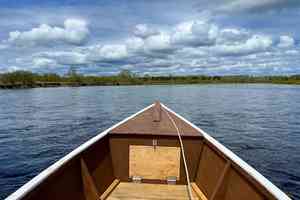


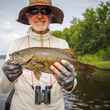




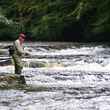




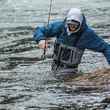





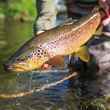
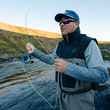
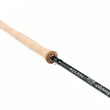

Comments
Tobin replied on Permalink
Boats do take time - I am rebuilding an early 90's wood skiff right now. but I do enjoy the process and it was cheap to buy and came with a good Baker trailer that just needed a quick rewire. And since my wife does not fish, but loves to float and row, I can fish the entire float so I figure it makes up for the boat work time.
Bob Fornadley replied on Permalink
Good article and written very honestly on a subject you don't normally see. Here is my one and only issue -my sea legs... I am going on 71 years old and my passion is , and always has been for the last 58 years , fly fishing anywhere for anything. Yet when down in Tampa Bay or floating any larger river my ankles just can't take the uneasy rocking of the boat for any length of time and I have to sit down sooner or later and do my casting. Not that sitting to cast for me is hard ; it's not.
... but I'd rather stand if I could. I'm not alone on this issue by any stretch and I wish guides and boat builders would take this into account for us older guys (who have the money to pay and tip well) who aren't as steady on our feet as the younger guys. This is why I'm a "wade" fisherman first.
Cody replied on Permalink
Nicely written as always. I just got my first boat last October. I either fish alone with my pup or take a buddy on it. And of course, I'm always on the oar. I tend to like it. I appreciate the teamwork that goes into it. When the angler up front catches that riser we slowly worked the boat to and positioned for the strike, it feels like we both caught that fish. It's a team effort, and better than any day in the office.
Pages